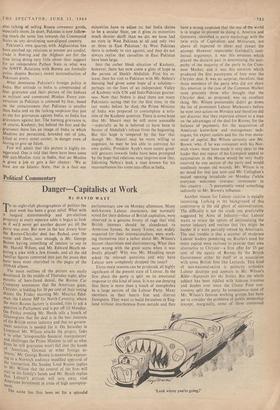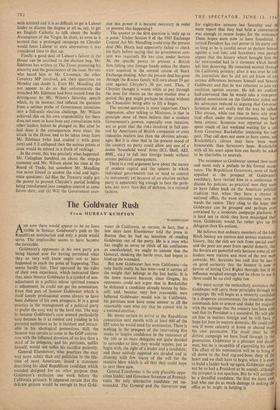Political Commentary
Danger—Capitalists at Work
By DAVID WATT
To us night-club photographers of politics the past week has been a great relief. What with a languid statesmanship and pre-election propriety at every separate table it began to look as if we'd never get another decent pic till the Party was over. But now in the last dreary hour the Rootes-Chrysler deal has flashed over the scene and there, ,sure enough, is Mr. George BrOwn having something of interest to say to Mr. Harold Wilson, and Mr. Edward Heath en- joying a joke with a few friends, and all the old familiar figures contorted into just the poses that have been most cherished in the pages of the 1959-64 album.
The main outlines of the picture are easily developed. In the middle of Thursday night, after months of bare-faced denial, the Rootes Car Company announces that the American giant, Chrysler, is bidding for 30 per cent of their voting shares. On Friday morning Mr. Maurice Edel- man, the Labour MP for North Coventry, where the main Rootes factory is situated, tries to ask a question in Parliament and is put off till Monday. 011 Friday evening Mr. Heath tells a bunch of Glaswegians that the deal is in the best interests of the British motor industry and that no govern- ment sanction is needed for it. On Saturday in Liverpool Mr. Wilson attacks the project, links it to other 'irresponsible financial manipulators' and challenges the Prime Minister to tell us what firms he will guarantee won't fall into the hands of 'American, German or other foreign in- terests.' Mr. George Brown is meanwhile express- ing to a Norwich audience modified approval of the transaction. On Sunday Lord Rootes replies to Mr. Wilson that the control of the firm will stay in his family's hands and Mr. Heath replies that Labour's attitude will turn away vital
American investment in areas of high unemploy- ment.
The scene has thus been set for a splendid parliamentary row on Monday afternoon. Many well-known Labour characters, not normally noted for their defence of British capitalists, were observed in a genuine frenzy of rage that vital British interests should be abandoned, to American hyenas. As many Tories, not widely respected for their internationalism, were work- ing themselves into a lather about Mr. Wilson's blatant chauvinism and electioneering. What then went wrong with the great scene when it was finally played? Why was Mr. Maudling never asked the relevant questions and why have Labour now completely dropped the issue?
Three main reasons can be produced, all highly significant of the present state of Labour. In the first place the party is split on its emotional response to this kind of issue. It is no use denying that there is more than a touch of xenophobia in a large section of the Labour Party. Many members in their hearts fear and distrust foreigners. They want to build Jerusalem in Eng- land without interference from outside and they
have a strong suspicion that the rest of the world is in league to prevent us doing it. America and Germany, identified in party mythology with the twin evils of Capitalism. and Militarism, are above all expected to cheat and thwart the attempt. However respectable Gaitskell's intel- lectual arguments, it was this emotion which played the decisive part in determining the anti- pathy of the majority of the party to the Com- mon Market, and it was this emotion which produced the first paroxysms of fury over the Chrysler deal. It was no surprise, therefore, that those members of the party who did not share this emotion in the case of the Common Market were precisely those who thought that the Chrysler deal, as proposed, was an excellent thing. Mr. Wilson presumably didn't go down the list of prominent Labour Marketeers before he went into action on Monday and therefore did not discover that they expatiate almost to a man on the advantages of the deal for Rootes, for the balance of payments, for the acquisition of American know-how and management tech- niques, for export outlets and for the free move- ment of capital. But Wilson certainly saw Mr. Brown, who, if he was consistent with his Nor- wich views, must have,made it very clear to the leader that any repeat of his Liverpool appeal to nationalism in the House would be very badly received by one section of the party and would needlessly reopen old wounds. Mr. Wilson is in no mood for that just now and Mr. Callaghan's muted opening broadside on Monday ('while everyone welcomes overseas investment in this country . . .') presumably owed something indirectly to Mr. Brown's influence.
Another reason for Labour caution is equally interesting. Lurking in the background of this controversy is the old ghost of nationalisation. The difficulty is not the crude one predictably suggested by Aims of Industry—that Labour wants to retain the option of nationalising the motor industry and realises that this might be harder if it were partially owned by Americans. The real trouble is that a number of moderate Labour leaders pondering on Rootes's need for more capital were inclined to provide their own alternative to Chrysler—a firm offer for 25 per cent of the equity of Rootes by the British Government either by itself or in association with some British firm like Leylands. This kind of neo-nationalisation is perfectly orthodox Labour doctrine and appears in Mr. Wilson's Bible—Signposts for the Sixties. But the whole subject has been riddled with hideous traumas and doubts ever since the Clause Four con- troversy split the party. In consequence none of Mr. Wilson's famous working groups has been set to consider the problems of public ownership (except, marginally, some of those concerned
'Look where you're going!' with science) and it is as difficult to get a Labour leader to discuss the dogma at all as, say, to get an English Catholic to talk about the bodily Assumption of the Virgin. In short, as soon as it seemed that a prolonged campaign on Chrysler would force Labour to state alternatives it was considered time to shut up.
Finally a good deal of Labour's failure in the House can be ascribed to the election bug. Mr. Edelman has written to The Times protesting his sincerity and the genuineness of the issue. No one who heard him or Mr. Grossman; the other Coventry MP involved, ask their questions on Monday can doubt it. Even Mr. Maudling did not appear to do so. But unfortunately the wretched Mr. Edelman had been ousted from the driving-seat by Mr. Wilson's Saturday speech which, by its manner, had inflated the question from a serious probe of Government intentions into a full-scale election challenge. Mr. Wilson achieved this on his own responsibility for there does not seem to have been any consultation with other leaders before he plunged in. But after he bad done it the consequences were clear; the attack in the House had to be taken away from Mr. Edelman (who had studied it with great care) and if it collapsed then the serious points at issue would be missed in a froth of verbiage.
In the event, this was precisely what happened. Mr. Callaghan bumbled on about the stop-go economy and Mr. Wilson about his time at the Board of Trade, but somehow Mr. Maudling was never forced to answer the vital and legiti- mate questions: (a) Has the Treasury really got the power to prevent Chrysler's partial holding being transformed into complete control at some future date; and (b) Will the Government exer-
cise this power if it became necessary in order to prevent this happening?
The answer to the first question is 'only up to a point.' Under Section 9 of the 1947 Exchange Control Act Mr. Maudling could stop the present deal (Mr. Heath had apparently failed to check his facts before saying that no government con-. sent was required). He has also, under Section 30, the specific power to prevent a British firm falling into foreign hands unless the shares were acquired in the normal course of Stock Exchange dealing. After the present deal has gone through the Rootes family will own about 39 per cent against Chrysler's 30 per cent. Thus, if Chrysler thought it worth while to pay through the nose for shares on the open market over a period this gap might perhaps be closed without the Chancellor being able to lift a finger.
The second question is more important. One's impression, after talking to Ministers, is that in principle most of them believe that a modern Government's powers, especially over taxation, are so great that the risks involved in full con- trol by Americans of British companies or even industries matters less than the obvious advant- ages. But it is clear that in the present mood of the country no party could allow any one of a dozen 'household word' firms (ICI, Shell, AEI, BMC, etc.) to fall into foreign hands without serious political consequences.
There is a real argument here about the nature of modern capital and the spheres in which individual governments can or need to control its movement; yet because of an election neither party is apparently big enough to face the prob- lem, any more than that of defence, in a rational fashion.



































 Previous page
Previous page